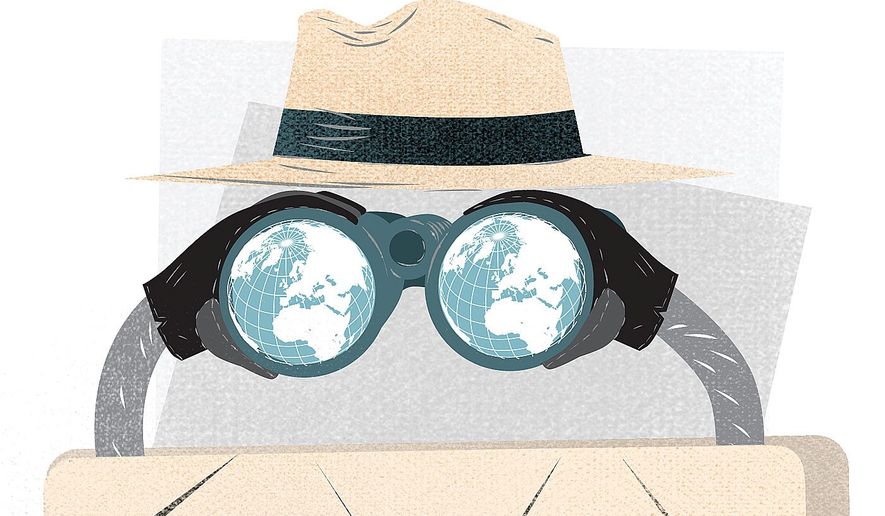OPINION:
The recent intelligence report on Russian interference in the election concluded that the Russian government was behind the hacking and release of Democratic emails. The assumed purpose of these activities was an effort to support the candidacy of Donald Trump, even though the report acknowledged that the Russian government believed Hillary Clinton was likely to win the election anyway. That seems to be a bit of a stretch, one that invites skepticism. Which brings us to the other controversy that is consuming Washington, the belated release of the so-called “dossier” on the Russian government’s supposed contacts with Mr. Trump.
The only thing that seems certain about the dossier is that it was an effort to spy on the Russian government. After Mr. Trump clinched the Republican nomination, a private firm in Britain began preparing the intelligence reports in the dossier. They contained sensational allegations of ties between Russian government officials and Mr. Trump. Its asserted sources were Russian, including none other than an officer of the Russian FSB, the successor to the KGB. Reportedly, the private British investigators were conducting this intelligence gathering, or spying, under contract to an American private investigations company, which by that time reportedly was working for the Democrats.
It should come as no surprise that the Democratically commissioned dossier is virtually incredible. It makes sloppy, gossipy, unverifiable and occasionally bizarre claims on the basis of what it asserts are extensive contacts with senior Russian officials, including Russian intelligence officers. Reading the dossier leads inexorably to one of two conclusions: Either it was a fabrication by its authors, or Russian intelligence knew all about their activities. Russia is not the kind of country where that kind of stuff happens in any other way, and no other potential explanation for the document seems plausible. If Russian intelligence knew about the investigation, of course, then it could be disinformation or just plain nonsense. Either way, chances are the Russian government knew about the investigation, knew supporters of Mrs. Clinton were behind it, and knew they were trying to dig up information about possible ties between Russian officials and the Republican nominee.
The dossier has been circulating in Washington for months. Major press outlets have been busy patting themselves on the back for not publishing it before the election, on the asserted grounds that its sensational assertions could not be verified. That is a bit unconvincing. Perhaps the real explanation lies in the fact that if they published it, they would invariably have to reveal the identity of its creators, including those who contracted for and disseminated the dossier. Then the nation might have been confronted with a story before the election that Democrats had hired people to spy on Russia to get dirt on Mr. Trump. That could have been an embarrassing, if not worse, tale of dirty tricks. And portraying Democrats as victims of the Russians is a much better headline than the other way around. After all, the politics of victimization at times can appear to be a central platform of the Democratic Party.
The strangest part of this story is that the so-called intelligence community in the United States reportedly got bamboozled into briefing President Obama and President-elect Trump on the dossier, and possibly presenting a summary of it to them. At that point, it became free game for a gullible press, and it was leaked immediately. However, that it most likely was paid for by Democratic interests and was manifestly an effort to spy on the activities of Russian officials seem to have been lost in the debate about its lurid assertions. Some of Washington’s most serious and self-absorbed correspondents have been so busy falling all over themselves with concern about the implications of the dossier’s sensational allegations that they have lost the main story about it. That is the fact that the dossier is an exercise in amateur international espionage directed at Russia and apparently commissioned by Democratic political operatives during the campaign.
The real story here is that the perfidious Russians were themselves being spied on. That seems like a pretty dumb thing to do, particularly since the Russians are masters of the art of espionage. The British, on the other hand, are not. Whatever people may think of the fictional George Smiley, the real MI6 has not been known for its success in dealing with its Russian adversaries. History reminds us that the Russian government had MI6 in its pocket for years after the war. And we are not even dealing with MI6 here, but rather a former officer of that agency. Hopefully, the CIA is in a better position to get to the bottom of this. It once was. But it is somewhat surprising that the agency did not know about the spying at the time.
One thing is clear. If Washington really wants to find out what happened, it should examine who commissioned the private effort to collect Russian intelligence on that government’s contacts, activities and objectives with Donald Trump, who actually paid for it and with whose money. Espionage is supposed to be a serious business best left to governments. That someone in the Democratic Party apparently did not have the intelligence to understand that lesson may be the only verifiable story in this sorry and sordid episode. And it tends to put Russia’s own activities in a somewhat different light.
Finally, a note about the Russians. They may well have real dossiers on political figures. That should not be a surprise to anyone. However, it seems doubtful that they would be dumb enough to miss what was really going on here. That, apparently, is the job of the press.
• Warren L. Dean Jr. is a lawyer and adjunct professor of law at Georgetown University Law Center.




Please read our comment policy before commenting.